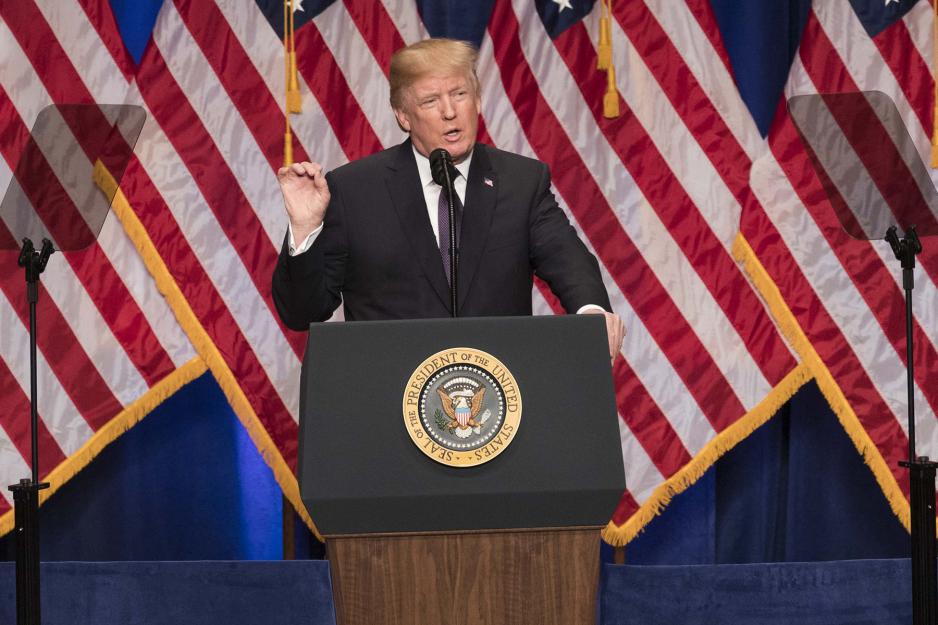U.S. Sought to Remove References to Climate Change From Declaration

Arctic Council negotiations are consensus based, which means that all eight member states must agree in order for a decision to be made. In Fairbanks, Alaska in 2017, the Trump administration tried to weaken a formulation in the declaration about climate changes, climate gas emissions and renewable energy, which muddled the work on the declaration.
The Trump administration wanted no reference to climate change or the Paris international climate agreement in the joint statement to be issued in Finland next week, sources tell Washington Post.
The Arctic Council declaration is an affirmation of goals and principles among the eight Arctic nations, which meet every two years.
Sources tell Washington Post that the Trump administration, at least initially, threatened a standoff in which the United States would not sign onto a statement that included climate discussion. But other members would not agree to a version that left it out, according to senior diplomats and others familiar with the discussions.
Trouble
As High North News reported last week, there has been trouble finding a language every eight Arctic member state can agree on. Senior Arctic Official (SAO) from Norway, Bård Ivar Svendsen, admitted the negotiations were challenging. "We had a long meeting in Finland in March during which we made some progress, however, there are still issues remaining. We have to work out both a strategy and a declaration, and the two are obviously related. We will probably work up until and during the ministerial meeting in order to reach our goal".
Several news sites has pointed to the overall climate skepticism in the Trump administration as the most likely source for the challenges, but this has not been confirmed by any of the SAOs.
Read also:
Resistance
Thursday however, The Washingon Post, claim to have spoken officials from three of the eight member states, who all point the finger at the US. One official familiar with the preparations for this year’s meeting said that at meetings last month, the United States “indicated its resistance to any mention of climate change whatsoever.”
Elana Wilson Rowe, who is research professor at NUPI (Norwegian Institute of International Affairs) and an adjunct professor at Nord University, said to High North News it would be a moral failure if the Arctic states do not reach agreement on a statement about climate in their joint declaration.
“The Arctic Council is not the forum where the problem of global climate change will be solved. The challenge is bigger than that. But a statement that acknowledges a shared commitment to addressing climate change is still important because it can impact how the issue is addressed internationally" she argued.
Softened
All three officials tells The Washington Post, on the condition of anonymity, the United States initially wanted no reference to climate change or the Paris international climate agreement in the joint statement to be issued in Finland next week.
“At one point, they wanted to remove the expression ‘climate change’ and blocked references of the Paris agreement and other international agreements in the language. But the dialogue has improved during the last couple of days,” a senior official said.
Another however, says the U.S. position appears to have softened in recent days.
Aleksi Härkönen, SAO Chair from Finland is nonspecific when asked about the negotiations, but tell Washington Post the remaining differences reflect “different shades of gray.” "I sense the willingness to make compromises. I believe this will be the outcome. But we are not there yet.” he says.
No comment
The State Department did not respond directly to questions from The Washington Post about the U.S. position. Later, during a briefing with reporters previewing the trip, a senior State Department official declined to address whether the United States had taken such a hard line.
“Obviously, we don’t discuss details of ongoing negotiations,” said the official, who spoke on the condition of anonymity under State Department rules. “When we don’t agree with allies and friends, we talk about it with them directly and closely.".
In Finland, Pompeo will give a speech on U.S. policy in the Arctic that is expected to address U.S. concerns about Chinese and other foreign activities in the region
House will force U.S to stay in Paris Agreement
While president Donald Trump continues to express skepticism about the causes and severity of climate change, despite the scientific consensus on the issue, House passes bill to force U.S. to stay in Paris climate agreement.
However, the Democratic measure is unlikely to pass the GOP-controlled Senate. But House leaders hope to use it to paint Trump and other Republicans as backward on climate change, The Washington post reports.
Not the first time
Arctic Council negotiations are consensus based, which means that all eight member states must agree in order for a decision to be made.
In Fairbanks, Alaska in 2017, the Trump administration tried to weaken a formulation in the declaration about climate changes, climate gas emissions and renewable energy, which muddled the work on the declaration.
One finally succeeded in having the Fairbanks Declaration approved with its embracing of the Paris Accord, as well as formulations such as “we are worried about climate changes” and “wanting to encourage more research in the area”.

